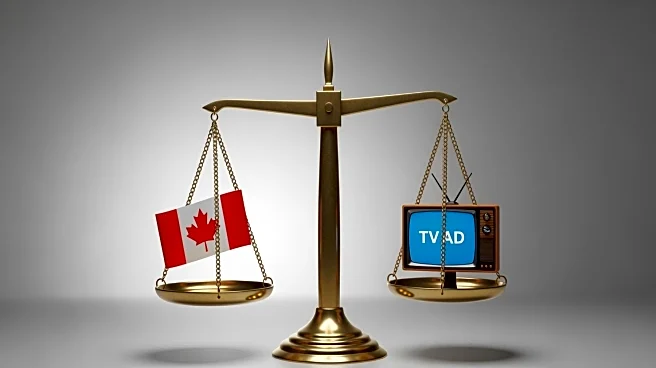What's Happening?
President Trump has announced an additional 10% tariff on Canadian imports, citing a TV advertisement aired by the Ontario provincial government as the catalyst. The ad, featuring former President Ronald
Reagan criticizing tariffs, was deemed by Trump as a 'serious misrepresentation of the facts' and a 'hostile act.' This move comes as the Supreme Court is set to hear arguments on November 5 regarding Trump's authority to invoke the International Emergency Economic Powers Act (IEEPA) for imposing tariffs. The IEEPA, however, explicitly prohibits its use against 'information or informational materials,' raising questions about the legality of Trump's action. Peter Harrell, a scholar at Georgetown’s Institute of International Economic Law, highlighted this legal limitation, suggesting that the tariffs could be more illegal than previous ones. The current base tariff rate on Canada is 35%, but it does not apply to goods compliant with the US-Mexico-Canada Agreement.
Why It's Important?
The imposition of additional tariffs on Canada by President Trump could have significant implications for U.S.-Canada trade relations and the broader economic landscape. The legal challenge surrounding the use of IEEPA for such tariffs could set a precedent for future trade policies and executive powers. If the Supreme Court rules against Trump's use of IEEPA, it could limit the executive branch's ability to unilaterally impose tariffs, potentially affecting U.S. trade strategy. The tariffs could also strain diplomatic relations with Canada, a key trading partner, and impact industries reliant on Canadian imports. Businesses and consumers might face increased costs, leading to potential economic repercussions.
What's Next?
The upcoming Supreme Court hearing on November 5 will be crucial in determining the legality of President Trump's use of IEEPA for imposing tariffs. A ruling against Trump could lead to the removal of the tariffs and reshape the legal framework governing trade policy. Stakeholders, including businesses and trade associations, are likely to closely monitor the proceedings, as the outcome could influence future trade negotiations and economic policies. Additionally, Canada may seek diplomatic or legal avenues to challenge the tariffs, further complicating bilateral relations.









